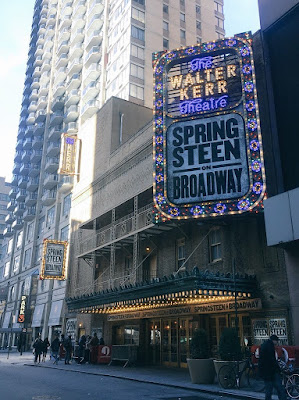LIKE AMERICA, like most things in life, there’s an easy, surface-level reading of
Bruce Springsteen: stars-and-stripes thick-necked denim-clad bombastic muscle
bro - looked kind of dorky before the 80s - who sings about blue-collar workers and cars and chasing girls on Friday nights. Dad-rock alert! But
when you really listen to him, read about him, see him sweat before your eyes,
that image explodes into multiple layers, as complex as the country he sings about.
Springsteen on Broadway is a fast-track to
exploding those layers, the myth laid bare under industrial stage light. The
performance makes sense of the feelings his music and live shows give you. On
Broadway, Springsteen songs feel like museum exhibits, not in a dull dusty way,
but in how he exposes each song on stage, vulnerable, stripped and examined
from all angles. Songs as exhibits, until he rattles their bones out to the
audience, and builds something new but not-new out of them. The Promised Land,
a-capella. The gutsy blues of Born in the USA, how’d Reagan like the sound of
that now, anger in plain sight.
I
didn’t think I needed Broadway Bruce, thought I knew it all already: the names
of his aunts, the shapes of his demons, the way his hometown smells in August
rain and November snow. I’d watched him read from his autobiography in a San Francisco theatre in 2016, and wondered if I’d be in for a similar
experience. The cynic in me thought the whole venture was easy money.
Well,
there was nothing recycled about this experience. And money, yes, but easy? Fuck
no. ‘I’ve never worked five days a week -
until right now,’ Springsteen says during the show. ‘I don’t like it.’ His
point is that as a lifelong musician, he’s completely unqualified to sing about
working-class labour, the factory life that's defined both the generation
of his time and the main thrust of his music. But his remark is also a nod to the
show’s imperceptible toil. Five performances, five days a week, 236 shows in
total (a run longer than any Bruce Springsteen and the E Street Band tour): seventeen
songs laced together with a tight script, over and over, week in week out. This
is a kind of strenuous repetition that also belongs to the factory line, and it’s
therefore reasonable to consider Springsteen on Broadway as his own warped version
of factory work.
But Springsteen’s not mass-producing anything material. On
stage, over and over again in factory style, he perpetuates his own mythology – that blue-collar easy read - even as he works to dismantle it.



No comments:
Post a Comment